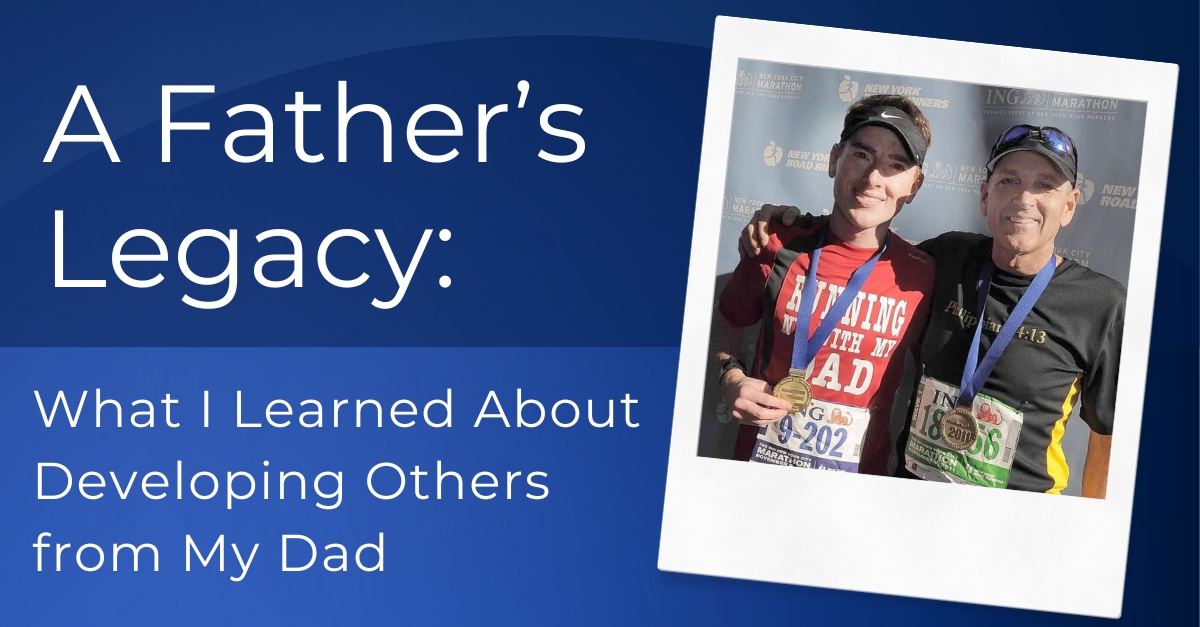
Father’s Day is a time for many things – backyard barbecues, sentimental phone calls, and dad jokes. For me, it’s a chance to reflect on the immense impact my dad had on my life. Since his passing two years ago, this day has taken on a deeper meaning, reminding me not just of the wonderful man he was, but of the countless lives he touched with his dedication to developing others.
Born and raised in Indianapolis, my dad embodied the quintessential Midwestern businessman – hardworking, humble, and committed to doing the right thing. His passion for helping others naturally led him to a career in sales, where he honed his relationship-building skills by managing teams in the food packing industry. He also possessed the touch of the entrepreneur, owning a Little Debbie Snack Cake territory outside of Indianapolis. He finished his career leading various teams at Southern Champion Tray in Chattanooga, TN. Regardless of his role, one thing remained constant: his genuine care for the people he managed. He saw them not just as employees but as individuals with potential waiting to be unlocked.
As his son, I’m undoubtedly a product of his dedication to development. His drive, entrepreneurial spirit, and commitment to working with integrity and humility are all qualities I inherited, both through my DNA and his nurturing guidance.
From Church Buses to Boston Marathons: Lessons I Learned from Dad
This Father’s Day, I want to share some of the unique principles I learned from him about developing others. These principles have not only shaped my career as a business leader but also my approach as a father, friend, and church member.
1. Be a Giver: The Power of Unconditional Support
Adam Grant’s book, “Give and Take,” outlines three personality types within organizations: givers, takers, and matchers. “Givers” are those who prioritize the well-being of others. They are crucial for individual and corporate success. Grant quotes Samuel Johnson, who said, “The true measure of a man is how he treats someone who can do him absolutely no good.” This perfectly captured my dad. He was a giver in the truest sense.
One memory that exemplifies this is his Sunday morning church bus route in Indianapolis. My brother and I would join him to pick up kids, often helping them finish getting ready as they made their way onto the bus. Witnessing the way his compassion and humility extended to make a difference in the lives of the community shaped how I see giving back in my own life.
2. Developing Others Starts by Being a Student of How They’re Wired
Stephen Covey’s “7 Habits of Highly Effective People” emphasizes the importance of “seeking first to understand, then to be understood.” My dad embodied this principle in everything he did. Professionally, he wasn’t just a salesman; he was a master at connecting with people on their terms. He built genuine relationships that extended far beyond closing deals. He applied this same approach when developing others, taking the time to understand their strengths and tailoring his approach accordingly.
My dad’s approach to parenting and developing my brother and me is a perfect example of this principle. After discovering an interest in distance running in my twenties, I set a goal to run a marathon before turning 30. My dad, at 55, surprised me by saying, “I’ll do it with you.” He became a marathon runner because I was a marathon runner, culminating in our shared experience running the Boston Marathon together in 2007. Conversely, my brother, enjoyed doing home projects and wood working, required a different approach. Dad remained flexible, connecting with him in a way that resonated with his personality.
3. The Best Person to Invest In Is the Person Right in Front of You
My dad was incredibly present, approaching every relationship with the mindset of investing in them. He didn’t wait for grand opportunities; he saw the potential in those around him, regardless of their position or title. Before he retired, he mentored an employee who eventually replaced him and not only developed her as a business professional but connected with her in a fatherly way culminating in her asking him to give her away at her wedding.
This is where the business world often falls short. We get caught up in formal development programs, neglecting the power of organic investment in those we interact with daily.
The Ripple Effect: Honoring the Investors in Our Lives
My dad had no desire to be a renowned business coach or thought leader. But I challenge you to find anyone who would disagree that the principles he lived by are invaluable when it comes to developing others.
Whether you view this through a professional or personal lens, we’ve all benefitted from someone investing in us. Perhaps it was a father, a mentor, or a friend. These experiences have shaped how you approach investing in others – acknowledge and honor that legacy. Recognize the gifts these relationships represent and use them to shape your own approach to development. May we all strive to create a generational legacy, whether through our families or work relationships, by investing in those we encounter on life’s journey.
By Kent Wilson
